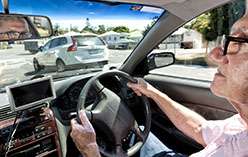A new study looks at who older drivers listen to when behind the wheel.
Studies show older drivers self-regulate their actions behind the wheel, but now a QUT road safety researcher is looking to find out who and what influences their driving decisions and how this feedback can improve road safety.
Heidy Hassan, from QUT's Centre for Accident Research & Road Safety - Queensland (CARRS-Q), said feedback was an everyday part of life for all drivers and for older drivers it could help guide their decision to continue driving or hand back the keys.
"Research has found that encouraging older drivers to self-regulate their driving rather than revoking their licence based on age, has the potential to improve safety and maintain independence," Ms Hassan said.
"What my study is looking to do is investigate who has influence over older drivers and what impact this feedback has on their driving decisions and performance.
"My previous research has found that feedback may help increase older drivers' awareness about their driving behaviours including limitations in their driving ability.
"But what we don't know is how feedback is best received by older drivers and what we can do to use this feedback in a positive way to help promote safer driving."
Ms Hassan said feedback and influence from others could prove a valuable tool in the design of an intervention program to improve safety for older drivers, but any program needed to target the individual needs of older drivers.
She said as people age, their functional and sensory ability declines which could compromise their driving.
"Older drivers compensate for these changes by regulating their driving behaviour, for example avoiding peak hour traffic, not driving at night or only travelling short distances," she said.
"It has been suggested that older adults' insight into their own limitations is crucial for safe driving but there has been little research on the impact of feedback on older drivers' self-awareness and subsequent self-regulatory behaviours."
Ms Hassan said the number of drivers over the age of 65 was expected to double on Australian roads in the next three decades.
"It is estimated that by the year 2031, one in five Queenslanders will be aged 65 years or older," Ms Hassan said.
"Previous research shows that although the risk of being involved in a crash is lower for seniors than young people in terms of rate per population, the risk of being killed when a crash occurs is much greater due to the increased fragility as the body ages."
As part of my study, I am calling for people aged 70 years or more, who have a current drivers licence to take part in an online survey.
"The survey is about getting a better understanding of older drivers, their driving history and their perception of risk," she said.
"It is also about finding out who is giving them feedback on their driving and who are they most likely to accept feedback from."
Provided by Queensland University of Technology





















